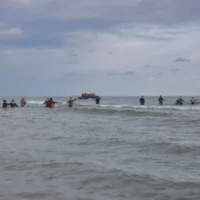
Death and Detention on the Texas Border
It began as a small group: a few dozen travelers drifting towards the border, full of fear and hope, united in the belief that they could change their fates. Well-wishers along the route gathered to bid them good luck, to pray for them, to remind them that they were on a righteous path. The group’s ranks swelled as they inched towards the invisible line that divides the United States and Mexico. Authorities kept an eye on the procession from afar and likely from within, gathering intelligence on its members, some of whom were rumored to be criminals. Locals who lived near the border whispered about the threat of violence.… Seguir leyendo »














